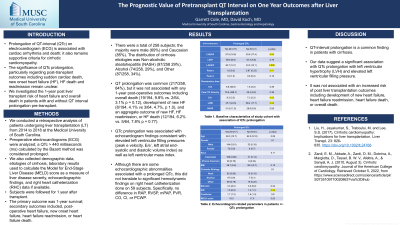Back


Poster Session D - Tuesday Morning
Category: Liver
D0495 - The Prognostic Value of Pretransplant QT Interval on 1-Year Outcomes After Liver Transplantation
Tuesday, October 25, 2022
10:00 AM – 12:00 PM ET
Location: Crown Ballroom

Has Audio

Garrett G. Cole, MD
MUSC
Charleston, SC
Presenting Author(s)
Garrett G. Cole, MD1, David Koch, MD2
1MUSC, Charleston, SC; 2Medical University of South Carolina, Charleston, SC
Introduction: Prolongation of QT-interval (QTc) on electrocardiogram (ECG) is associated with cardiac arrhythmia and death; it also remains supportive criteria for cirrhotic cardiomyopathy. The significance of QTc prolongation, particularly regarding post-transplant outcomes including sudden cardiac death, new onset heart failure (HF), HF death and readmission remain unclear. We investigated the 1-year post liver transplant risk of heart failure and overall death in patients with and without QT interval prolongation pre-transplant.
Methods: We conducted a retrospective analysis of patients undergoing liver transplantation (LT) from 2014 to 2018 at the Medical University of South Carolina. Preoperative electrocardiograms (ECG) were analyzed; a QTc > 440 milliseconds (ms) calculated by the Bazett method was considered prolonged. We also collected demographic data, etiologies of cirrhosis, laboratory results used to calculate the Model for End-Stage Liver Disease (MELD) score as a measure of liver disease severity, echocardiographic findings, and right heart catheterization (RHC) data if available. Subjects were followed for 1 year after transplant. The primary outcome was 1-year survival; secondary outcomes included post-operative heart failure (new onset heart failure, heart failure readmission, or heart failure death).
Results: There were a total of 258 subjects; the majority were male (69%) and Caucasian (85%). The distribution of cirrhosis etiologies was Non-alcoholic steatohepatitis (NASH) (97/258 29%), Alcohol (74/258, 29%), and Other (87/258, 34%). QT prolongation was common (217/258, 84%), but it was not associated with any 1-year post-operative outcomes including overall death (19/194, 9.8% vs.. 2/64, 3.1% p = 0.12), development of new HF (8/194, 4.1% vs 3/64, 4.7%, p 1.0), and an aggregate outcome of new HF, HF readmission, or HF death (12/194, 6.2% vs. 5/64, 7.8% p = 0.77). QTc prolongation was associated with echocardiogram findings consistent with elevated left ventricular filling pressures (peak e velocity, E/e’, left atrial end-systolic and diastolic volume index) as well as left ventricular mass index.
Discussion: QT-interval prolongation is a common finding in patients with cirrhosis that is associated with left ventricular hypertrophy (LVH) and elevated left ventricular filling pressure, but it was not associated with an increased risk of post liver transplantation outcomes including development of new heart failure, heart failure readmission, heart failure death, or overall death.
Disclosures:
Garrett G. Cole, MD1, David Koch, MD2. D0495 - The Prognostic Value of Pretransplant QT Interval on 1-Year Outcomes After Liver Transplantation, ACG 2022 Annual Scientific Meeting Abstracts. Charlotte, NC: American College of Gastroenterology.
1MUSC, Charleston, SC; 2Medical University of South Carolina, Charleston, SC
Introduction: Prolongation of QT-interval (QTc) on electrocardiogram (ECG) is associated with cardiac arrhythmia and death; it also remains supportive criteria for cirrhotic cardiomyopathy. The significance of QTc prolongation, particularly regarding post-transplant outcomes including sudden cardiac death, new onset heart failure (HF), HF death and readmission remain unclear. We investigated the 1-year post liver transplant risk of heart failure and overall death in patients with and without QT interval prolongation pre-transplant.
Methods: We conducted a retrospective analysis of patients undergoing liver transplantation (LT) from 2014 to 2018 at the Medical University of South Carolina. Preoperative electrocardiograms (ECG) were analyzed; a QTc > 440 milliseconds (ms) calculated by the Bazett method was considered prolonged. We also collected demographic data, etiologies of cirrhosis, laboratory results used to calculate the Model for End-Stage Liver Disease (MELD) score as a measure of liver disease severity, echocardiographic findings, and right heart catheterization (RHC) data if available. Subjects were followed for 1 year after transplant. The primary outcome was 1-year survival; secondary outcomes included post-operative heart failure (new onset heart failure, heart failure readmission, or heart failure death).
Results: There were a total of 258 subjects; the majority were male (69%) and Caucasian (85%). The distribution of cirrhosis etiologies was Non-alcoholic steatohepatitis (NASH) (97/258 29%), Alcohol (74/258, 29%), and Other (87/258, 34%). QT prolongation was common (217/258, 84%), but it was not associated with any 1-year post-operative outcomes including overall death (19/194, 9.8% vs.. 2/64, 3.1% p = 0.12), development of new HF (8/194, 4.1% vs 3/64, 4.7%, p 1.0), and an aggregate outcome of new HF, HF readmission, or HF death (12/194, 6.2% vs. 5/64, 7.8% p = 0.77). QTc prolongation was associated with echocardiogram findings consistent with elevated left ventricular filling pressures (peak e velocity, E/e’, left atrial end-systolic and diastolic volume index) as well as left ventricular mass index.
Discussion: QT-interval prolongation is a common finding in patients with cirrhosis that is associated with left ventricular hypertrophy (LVH) and elevated left ventricular filling pressure, but it was not associated with an increased risk of post liver transplantation outcomes including development of new heart failure, heart failure readmission, heart failure death, or overall death.
Disclosures:
Garrett Cole indicated no relevant financial relationships.
David Koch indicated no relevant financial relationships.
Garrett G. Cole, MD1, David Koch, MD2. D0495 - The Prognostic Value of Pretransplant QT Interval on 1-Year Outcomes After Liver Transplantation, ACG 2022 Annual Scientific Meeting Abstracts. Charlotte, NC: American College of Gastroenterology.
